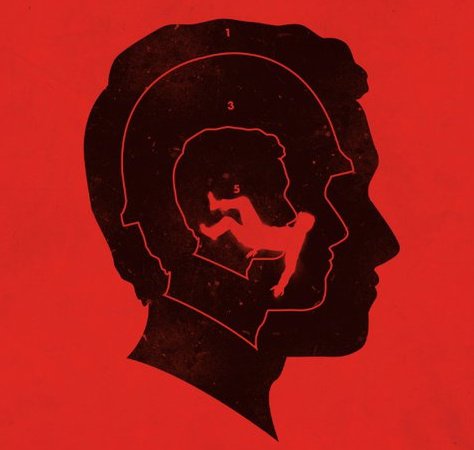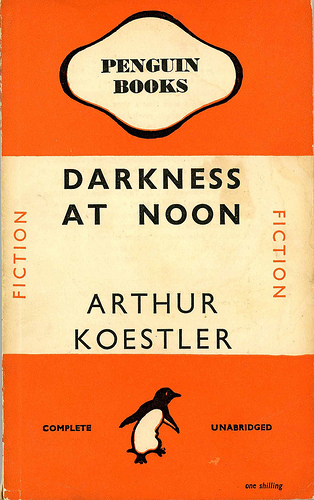We will pay, so it goes
I found Kurt Vonnegut’s Slaughterhouse 5 and Arthur Koestler’s Darkness at Noon in one of my engineer’s reading list on “Books that I found hard to put down“. Perhaps a radical reading of the ANT-dictum “follow the actors”, I decided to pile through both what these engineers did and what they read (as a literature critic, philosopher and friend of mine pointed out, they are worth reading anyhow).
To the question “What are you writing about”, Vonnegut’s reply was always “Dresden”, but in Slaughterhouse 5 this climatic event come and go in passing. The time travelling of the main character, Billy Pilgrim, contributes to the impact of the mass bombing on the mood of the story. Dresden always will happen, is happening and has happened. And the extermination of its population by fire bombs is a necessity in the war, the cause, the peace. “So it goes”.
The insanity surrounding Slaughterhouse 5 is pared with the curiosity and puzzlement of Pilgrim, always one step behind or, as we learn later, ahead. He awaits and faces his death with calm, having found dimensions of life that to most are in the realm of the metaphysical.

Koestler’s main character Rubashov too finds himself time travelling. Locked in his cell, in contemplations as intermissions from the interrogations lead by his former comrades of the Russian revolution. Rubashov, the former of hero of USSR ends his life accused of counter-revolutionary plotting against No 1, The Party and the People.
The fate of Rubashov and his comrades are that of the children being eaten by their own revolution; Jacobins and Robespierres wishing for nothing but “to sleep” and perhaps the vindication of posterity.
In conversation between Ivanov and Rubashov, the different worldviews of Darkness at Noon collide. Moralism and cynicism. As opposed to other revolutionaries, who were moralist dilettantes acting in good faith, we [USSR] for the first time are consequent, Ivanov remarked. Rubashov retorts with what I believe is also the summary of Koestler’s argument,
“So consequent; that in the interests of a just distribution of land we deliberately let die of starvation about five million farmers and their families in one year. So consequent were we in the liberation of human beings from the shackles of industrial exploitation that we sent about ten million people to do forced labour in the Arctic regions and the jungles of the East, under conditions similar to those of antique galley slaves. So consequent that, to settle a difference of opinion, we know only one argument: death, whether it is a matter of submarines, manure, or the party line to be followed in Indo-China. Our engineers work with the constant knowledge that an error in calculation may take them to prison or the scaffold; the higher officials in our administration ruin and destroy their subordinates, because they know that they will be held responsible for the slightest slip and be destroyed themselves; our poets settle discussions on questions of style by denunciations to the Secret Police, because the expressionists consider the naturalistic style counter-revolutionary, and vice versa. Acting consequentially in the interests of the coming generations, we have laid such terrible privations on the present one that its average length of life is shortened by a quarter. In order to defend the existence of the country, we have to take exceptional measures and make transition-stage laws, which are in every point contrary to the aims of the Revolution. The people’s standard of life is lower than it was before the Revolution; the labour conditions are harder, the discipline is more inhuman, the piece-work drudgery worse than in colonial countries with native coolies; we have lowered the age limit for capital punishment down to twelve years; our sexual laws are more narrow-minded than those of England, our leader-worship more Byzantine than that of the reactionary dictatorships. Our Press and our schools cultivate Chauvinism, militarism, dogmatism, conformism and ignorance. The arbitrary power of the Government is unlimited, and unexampled in history; freedom of the Press, of opinion and of movement are as thoroughly exterminated as though the proclamation of the Rights of Man had never been. We have built up the most gigantic police apparatus, with informers made a national Institution, and with the most refined scientific system of physical and mental torture. We whip the groaning masses of the country towards a theoretical future happiness, which only we can see. For the energies of this generation are exhausted; they were spent in the Revolution; for this generation is bled white and there is nothing left of it but a moaning, numbed, apathetic lump of sacrificial flesh. … Those are the consequences of our consequentialness. You called it vivisection morality. To me it sometimes seems as though the experimenters had torn the skin off the victim and left it standing with bared tissues, muscles and nerves. …”
The lesson to social causes are to question to means through which the ends are envisioned. To look through the barrel of a gun as were it telescope for gazing into the dreamy futures. What are the tools with which the future is crafted?
What I am struck by is how little Rubashov’s analysis is about Marxism and focuses more on how the former revolutionarydiscovers and contemplates humanism. In Marxist theory the labour by which people are involved in the revolution would be preferable or not based on what it did to the people involved. Engel once said that the tools we use change how we conceive of the world, a person wielding a hammer think more of the world in terms of spikes. This lead to Vygotskian psychology and pedagogy where learning is considered to be social, explicit and tool-oriented. By the same reasoning, although the end would justify the means, the means, i.e. the tools used, would in turn then change the people involved in it, hence the ends met. The means mean the end.
But ultimately Koestler does not search for the alternatives to blind faith in ideas, rather he paints the tragedy of conflicting ideals, drawn to their logical conclusion. The death of Ivanov and Rubashov are abstractions and belong, like the rest of their generation who were locked away somewhere in USSR, belong to the Party. The Party stake out the logic of history, and its enemies are anachronisms to be wiped out, epistemological mistakes corrected by their ontological expulsion, execution after having committed their erroneous trespassing from the revolution.

Yes Rubashov time travels like Pilgrim, but these are not places to also exist in, but memories to be revisited, to be reassessed and recognised as parts in his own undoing. “I will pay”. In the end, Rubashov’s life is inextricably linked to the totalitarian nightmare from which he cannot wake up, and not worth reliving,. If Rubashov could live again he would be an astronomer.
Both Vonnegut and Koestler believe in the synchronicity in ethics. There is no necessity for which humanism could be done away with, trampled down in the mud for a path of least resistance. There is so much to their respective universes that their characters know so little about. What is frightening is the degree by which the adversaries seek to stamp out uncertainties. “Dresden had to be bombed, you know that right?”, “The alternative to the way laid out by the Party is civil war, you know that right?” The Neanderthals would never understand how a conversation about ginniepigs could end up anywhere.